Cymru Premier: Wales' national league celebrates 30-year anniversary
- Published
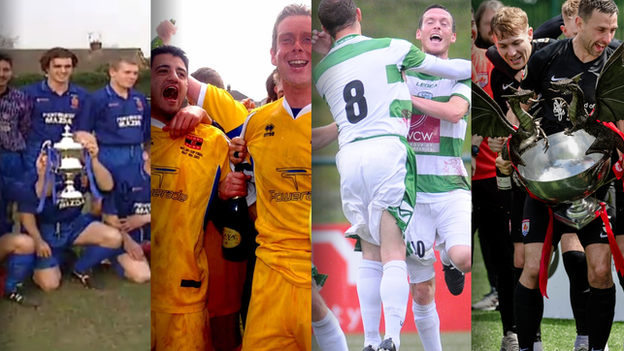
Previous champions (from left to right) Bangor City, Barry Town, TNS and Connah's Quay Nomads
The new Cymru Premier campaign kicks off this weekend - 30 years on from the competition's first season.
Then known as the League of Wales, its formation proved controversial and divisive, but 20 clubs created history in August 1992 with the opening round of games.
Of those 20, only two, Aberystwyth Town and Newtown, have been ever present, while others have either dropped out of the league or disappeared altogether.
BBC Sport Wales marks 30 years since the league's formation with the help of some of those who have been closely involved during its history.
Background - a difficult birth
Despite being the third oldest football association in the world, Wales did not have a national league until 1992.
Attempts had failed in the past to create a league which would bring together clubs from all over Wales, with poor travel links between north and south a factor.
Traditionally Wales' biggest clubs had played in the English system, including professional clubs in the Football League.
But the late 1980s saw the Football Association of Wales (FAW) revisit the idea once again, as Wales' status as an independent football nation came under threat with pressure on Fifa to insist on one Great Britain team.
Determined to safeguard Wales' status, the FAW's then secretary Alun Evans set out plans for a new national league.
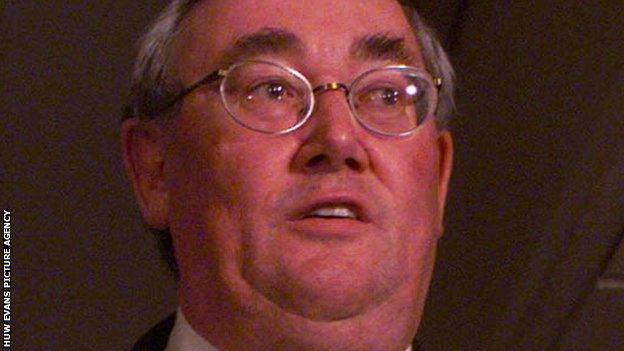
FAW secretary Alun Evans was the driving force behind the formation of the League of Wales
While the new proposals did not include the three Football League clubs at the time - Cardiff City, Swansea City and Wrexham - eight semi-professional Welsh clubs playing in England were reluctant to join.
While Merthyr Tydfil won an appeal to remain in England, seven other clubs were faced with a choice - return to Wales or be forced to play in exile.
Bangor City and Newtown would join the newly formed League before Rhyl returned to Wales to be joined by Barry Town after a season in exile.
Caernarfon Town, Colwyn Bay and Newport would eventually take what was an acrimonious fight to the High Court in London and win their case, but by then the fledgling league had established itself and gained European places.
"In many ways it ripped domestic football apart," said Ian Gwyn Hughes, who at the time was BBC Wales football correspondent.
"But in that period a lot of big decisions were made - Wales moved to the National Stadium and the League of Wales was certainly one of them.
"You felt you were part of something new and historical, setting something up."
Early days - 'A truly national league'
Saturday, 15 August 1992 was an historic day for Welsh football as 20 clubs kicked off on the opening day of the League of Wales.
Marc Lloyd Williams was a young striker with Porthmadog when the league began.
"We'd been in the Cymru Alliance for the previous couple of seasons," he said.
"The furthest you'd travel would be Caersws, Llanidloes or Rhayader and we'd been used to playing the north Wales coast clubs like Flint, Holywell and Conwy.
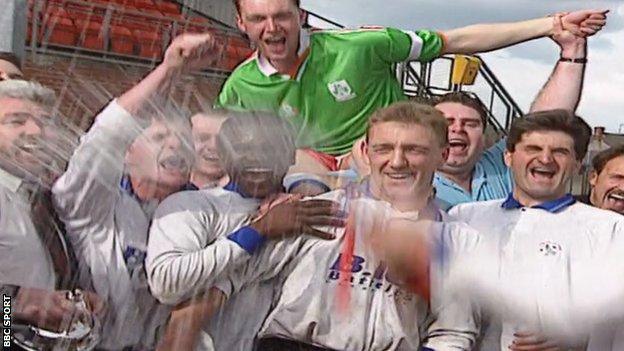
Cwmbran players celebrate the inaugural League of Wales title in 1993
"It was an adventure when you were going down to south Wales on a Saturday morning. It was certainly an exciting adventure for a 19-year-old."
Ian Gwyn Hughes was working at Aberystwyth for the opening weekend.
"You did see it as something that would improve Welsh football and it was a truly national league," he added.
"It involved clubs from every part of the country."
Teams - 'brilliant side'
Under manager Tony Wilcox, Cwmbran Town were inaugural champions of Wales and the first Welsh club to play in the European Cup - losing to Cork City over two legs.
Bangor City, one of the so-called original rebels, would win the next two titles under the guidance of then rookie player-manager Nigel Adkins.
Barry Town emerged as the dominant team with four consecutive titles.
But dreams of a fifth consecutive title were dashed on the final day of the 1999-2000 season and the emergence of a new force - The New Saints (TNS).
Barry would respond by winning the league for the next three seasons but their seventh title in 2003 would prove to be their last as the club experienced problems.
TNS would win three consecutive titles before Llanelli would lift the trophy for the one and only time in 2008 under former Wales international Peter Nicholas.
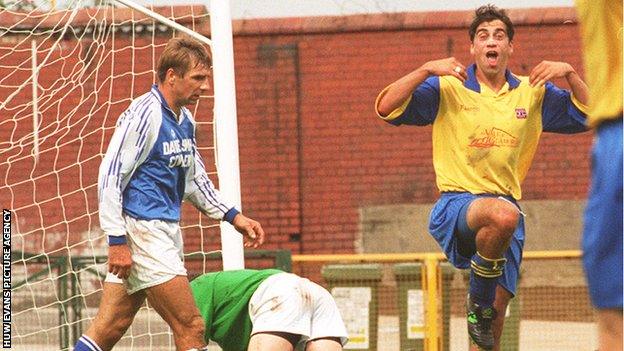
Barry Town's Darren Ryan celebrates a goal during their title winning 1996-97 season
Rhyl and Bangor would add to their own title haul but TNS won a record eight successive titles during which time the league reduced to a 12-team format.
The 2015-16 season saw Saints, under manager Craig Harrison, not only set a new Welsh Premier League record for consecutive wins but also a world record.
Their run of success was brought to an end in 2020 during a season ended prematurely by the Covid-19 pandemic.
Connah's Quay Nomads, under manager Andy Morrison, won back-to-back titles although Saints regained the title last season, the league's 30th campaign.
"TNS have been fantastic for the league," said former Port Talbot Town and Carmarthen boss Mark Jones, the Wales C manager.
"They are the standard bearers for the league at present while Connah's Quay had a couple of good years under Andy Morrison."
The feeling is echoed by Ian Gwyn Hughes when considering the stand-out teams of the past 30 years.
"But I have this soft spot for Gary Barnett's Barry team as well as the Giles brothers and following managers," he said.
"I really enjoyed watching them and they did have decent results in Europe as well."
Jones agreed they had a "brilliant side" and "maybe they just edge TNS over the three decades".
Players - 'best individual I've seen'
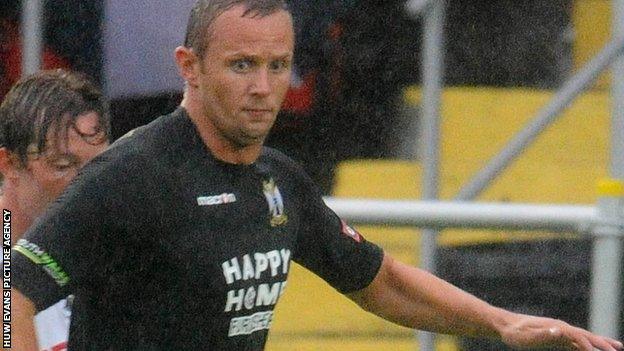
Lee Trundle played for Neath and Rhyl in the Cymru Premier
"We've had some great characters come from the league," Jones added.
"Most probably the best individual player I ever saw was Lee Trundle when he was at Rhyl and he went on to have a wonderful professional career. He was special from the first time I watched him."
Players who went on to play for Wales at senior international level came through the league, as Jones points out.
"Then there were Welsh internationals Owain Tudur Jones and Steve Evans and going right back Mark Delaney, who came from the league and had a wonderful international career," Jones said.
More recently Welsh internationals David Edwards, Jazz Richards, David Cotterill, Neal Eardley and Shaun MacDonald have joined Cymru Premier clubs.
"Players are coming to give something back, which happens in a lot of league in Europe," added Ian Gwyn Hughes.
"It's good to see it happening here in Wales and I saw Dave Edwards saying he enjoys his football more here than he has for years."
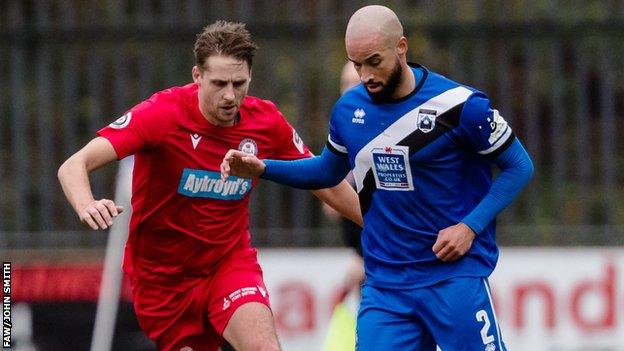
Bala's Dave Edwards in action against fellow Wales international Jazz Richards of Haverfordwest

SLAMMED: The rise of the Wales rugby team
A CAREER CHANGE WITH A DIFFERENCE: Police new recruits adapt to life on the beat

The future
"The standard, the pitches and facilities have improved," said Ian Gwyn Hughes.
"Noel Mooney, the chief executive of the FAW, is committed with grassroots football and is going to see how we can move the domestic football forward in terms of the Cymru Premier - what's its purpose? How can we improve results in Europe?
"If a Welsh club could get to the group stage of one of the European tournaments, it would make a huge difference.
"I'm not sure we could sustain a fully professional league in Wales. Other teams have tried it but it's only TNS that seem to have been able to maintain it with Mike Harris at the helm."
Having played in the league and before going on to be a commentator for S4C and BBC Radio Cymru, Lloyd Williams is better placed than anyone to assess the league's progress since 1992.
"The league is different now to what it was at the start," said Lloyd Williams, the league's all-time leading goalscorer.
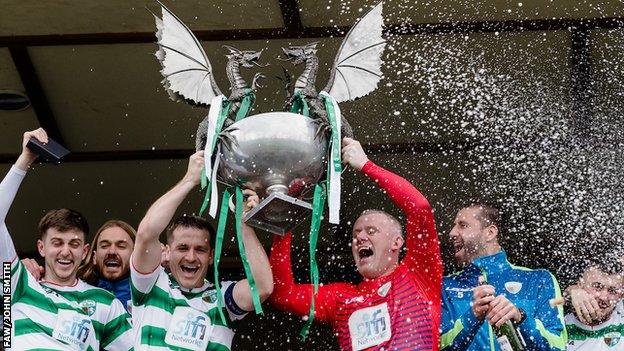
The New Saints players celebrate winning the 2021-22 Cymru Premier title
"The majority of the pitches are now 3G and the grass pitches that we've got are fantastic in the way that they get looked after.
"I used to go to some grounds and you were ankle deep in mud in the winter.
"And it was a different type of football played in those days - it was a lot more physical than it is today.
"There needs to be more investment into the league, whether that's from the FAW or from sponsorship deals and TV deals."
Lloyd Williams has been an advocate of summer football for a number of years
"You're not competing against the likes of Wrexham, Liverpool, Everton and the Manchester clubs every weekend," he said.
"Noel Mooney was in Ireland when they made the transition there and maybe it could be one of his agenda items to move the Cymru Premier to a summer model in the next few years."